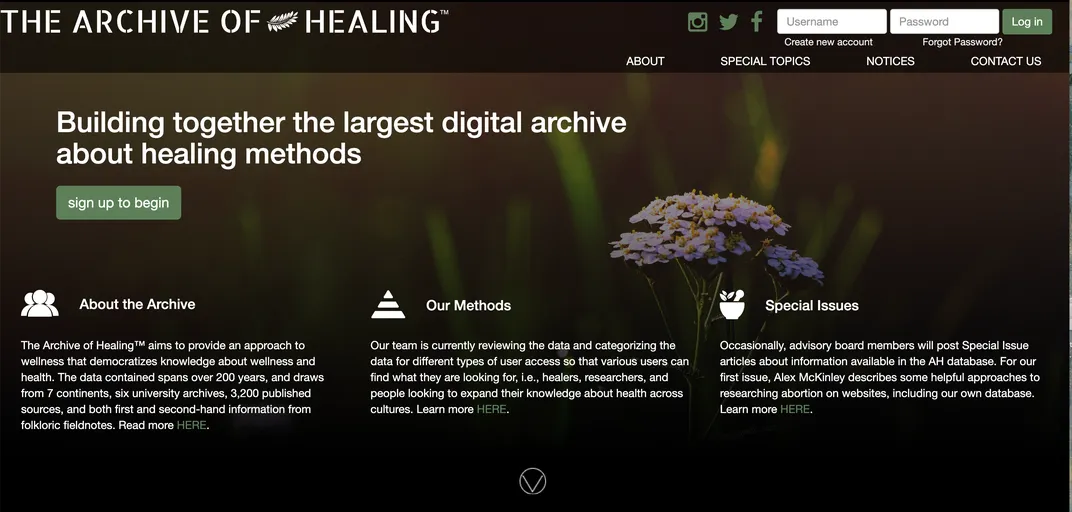How a New Digital Archive Preserves—and Protects—Indigenous Folk Medicine
UCLA’s database features hundreds of thousands of entries detailing traditional healing practices
:focal(941x713:942x714)/https://tf-cmsv2-smithsonianmag-media.s3.amazonaws.com/filer/01/52/015271c8-9708-476b-844d-3a54802f5f75/landis-brown-gvdfl_814_c-unsplash.jpg)
For thousands of years, people around the world have relied on medicinal folklore, herbal treatments and rituals to heal an array of ailments. Now, researchers from the University of California, Los Angeles (UCLA) have created an online platform featuring hundreds of thousands of these traditional therapies. Spanning seven continents and 200 years, the Archive of Healing draws on such sources as anthropologists’ field notes, scholarly journals, oral histories and folktales.
“The whole goal here is to democratize what we think of as healing and knowledge about healing, and take it across cultures in a way that’s respectful and gives attention to intellectual property rights,” says David Shorter, director of the digital archive, in a statement.
As Valentina Di Liscia reports for Hyperallergic, the database is one of the most inclusive catalogues of medicinal folklore in the world. A key goal of the project is preserving Indigenous treatments while ensuring that this knowledge is protected against exploitation by pharmaceutical companies seeking to make a profit. To that end, certain identifying details for plants and recipes are omitted from the archive.
Western medicine has, historically, overlooked herbal remedies used by women and Indigenous peoples. As folk herbalist Sade Musa explained for Healthline in 2019, many traditional treatments were passed down orally and, as a result, overlooked in favor of written documentation.

“[C]olonialism built a medical industrial complex through often violent means of cultural suppression, erasure, and exploitation,” noted Heathline. “The rise of the patriarchy also authorized only white male physicians to practice and define medicine for the world.”
Former faculty member Wayland Hand launched the UCLA database more than 40 years ago. In 1996, folklorist Michael Owen Jones began digitizing the collection of more than one million notecards—then known as the Archive of Traditional Medicine—after receiving a grant.
Speaking with Jeyling Chou of the Daily Bruin, UCLA’s independent student newspaper, in 2005, Jones said, “Folk medicine [includes] the beliefs and practices that we learn and teach in our first-hand interactions with one another in our everyday lives.”
He added, “It’s not institutional medicine, it’s not medicine that requires a license.”
After Jones’ retirement in 2007, the database “sat without much notice or investment of energy,” according to the Archive of Healing’s website. Then, in 2012, a university librarian brought the collection to Shorter’s attention. (The scholar had written a 2009 book documenting Yaqui, or Yoeme, communities in northwest Mexico and Arizona, in addition to creating an online database of Indigenous languages.)
“It was just sitting there probably for years without people knowing about it,” said Shorter in a 2020 podcast interview with UCLA Arts. “There are 700,000 to 800,000 data points on healing from all over the world.”
Per the archive’s website, Shorter began revamping the digital resource with the help of programmer Michael Lynch and students enrolled in a new, specially created class centered on interdisciplinary studies of healing. The team re-coded the data and built an online interface that shows visitors personalized results based on their status as a health care provider, researcher or general user.
Upon registering with the site, users can easily search for cures to conditions like common colds, bee stings and burns. Results can also be refined based on treatment type, from plant-based remedies to medicines that are worn, consumed or performed.
Given the uptick in medical misinformation during the Covid-19 pandemic, the team is quick to point out that the listings presented in the archive are not substitutes for expert medical counsel. Shorter and his students have removed around 200,000 potentially misleading entries from the original one million, reports Hyperallergic.
The Archive of Healing hopes to accept new contributions by late 2021 or early 2022—a feature that will enable users to swap information and suggestion, per the site’s FAQ.
“Whether in the classroom, in a wiki site, or like the archive itself, my impulse has been to find ways that we can make knowledge together in a shared process of creativity, challenge and inspiration,” says Shorter in the statement.
/https://tf-cmsv2-smithsonianmag-media.s3.amazonaws.com/accounts/headshot/Isis_Davis-Marks_thumbnail.png)
/https://tf-cmsv2-smithsonianmag-media.s3.amazonaws.com/accounts/headshot/Isis_Davis-Marks_thumbnail.png)